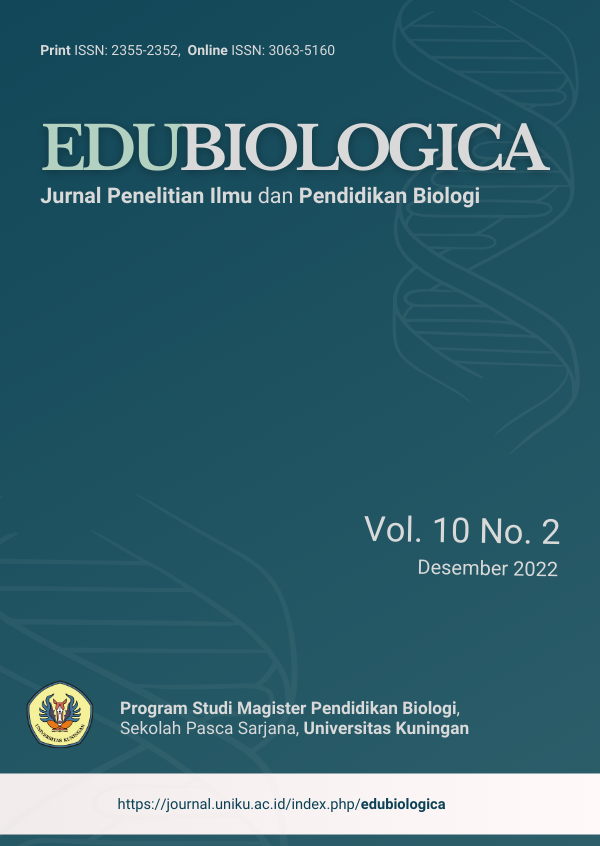Main Article Content
Abstract
The aim of study is to improve students’ creativity and critical thinking skills after implementing STEAM approach based on project based learning with online. The research method used a quasi-experimental design with a pretest-posttest control group. The sample used with purposively was 20 students, which were divided into experimental and control groups. Data was taken by using critical thinking skills test, questionnaires, observation, and documentation. The data analysis technique used descriptive analysis and the average difference test.
The conclusions of the study was: (1) There is a significant average difference in critical thinking skills between the experimental class and the control class after implementing the STEAM approach with the class that does not use the STEAM approach on Environmental Pollution Material in Class X SMA Negeri 1 Dukupuntang as evidenced by the value probability (p) 0.015 <0.05. (2) Student creativity in the experimental class on fluency indicators reaches 82.5%, flexibility indicators 90%, originality indicators 90% and elaboration indicators 86.88%, with an overall average score of 86.88% which is included in the very good category.
Article Details

This work is licensed under a Creative Commons Attribution-NonCommercial-ShareAlike 4.0 International License.
References
- Anderson, L. W., & Krathwohl, D. R. (2001). A Taxonomy for Learning, Teaching and Assessing (A Revision of Bloom’s Taxonomy of Educational Objectives). United States: Addison Wesley Longan.
- Bas, G, (2011). Investigating The Effects of Project Based Learning on Students Academic Achievement And Attitudes Towards English. TOJNED: The Online Journal of New Horisozon In Education. Vol. 1 (4). Oktober 2011.
- Dimyati, M. 2017. Pemanfaatan Teknologi Sebagai Media Pembelajaran Daring (On Line) Bagi Guru Dan Siswa Di Smk Nu Rogojampi. Jurnal Pengabdian Masyarakat J-DINAMIKA, Vol. 2, No. 2, Desember 2017.
- Ergul, N.R., & Kargin, E.F., (2014). The Effect of Project Based Learning on Students’ Science Success. Procedia Social and Behavioral Sciences,136, 537-541.
- Gonzalez, H. B., & Kuenzi, J. J. (2012). Science, tech¬nology, engineering, and mathematics (STEM) education: A primer.Congressional Research Ser-vice, Library of Congress.1-27.
- Hasanah, Luthiyatul. 2019. Pengembangan Modul Bioteknologi BerbasisSTEAM (Science, Technology, Engineering, Arts,And Mathematics) Dilengkapi Animasi FlashUntuk Pembelajaran Biologi Di SMA/MA. Jember: Universitas Jember.
- Jamaluddin, D. 2020. Pembelajaran Daring Masa Pandemik Covid-19 Pada Calon Guru: Hambatan, Solusi Dan Proyeksi. Karya Tulis Ilmiah, Lembaga Penelitian dan Pengabdian Kepada Masyarakat UIN Sunan Gunung Djati Bandung.
- Kosasih. 2014. Strategi Belajar dan Pembelajaran. Bandung: Yrama Widya
- Kristin, F. (2016). Analisis Model Pembelajaran Discovery Learning dalam Meningkatkan Hasil Belajar Siswa SD. Jurnal Pendidikan Dasar Perkhasa, 2 (1).
- Requies., J.M., Ion Agirre, V. Laura Barrio, Moisès Graells. 2018. Evolution of Project based Learning in Small Groups in environmental Engineering. Courses. Journal of Technology and Science Education JOTSE, 2018 – 8(1): 45-62.
- Sani, Ridwan Abdullah., 2015. Pembelajaran Saintifik untuk Implementasi Kurikulum 2013. Jakarta : Bumi Aksara.
- Suhada, Idad. 2020. Pembelajaran Daring Berbasis Google Classroom Mahasiswa Pendidikan Biologi Pada Masa Wabah Covid-19. Dosen UIN SGD Bandung.
- Yakman. 2008. STEAM Education: an Overview of Creating a Model of Integrative Education. STEAM Education, 1-28.
- Yakman, G., Lee, H. 2012. Exploring the Exemplary STEAM Education in the U.S.as a Practical educational Framework for Korea.J Korea Assoc, Sci, Edu, 32(6): 1072-1086.
